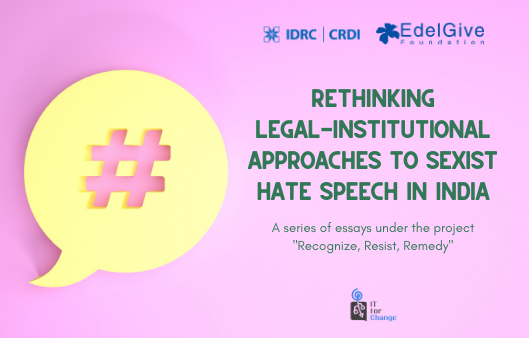IT for Change’s research – as part of our project Recognize, Resist, Remedy – has demonstrated a need for legal-institutional reform to combat sexist hate online. There is also a global acknowledgement today, such as from the Council of Europe and the EU, that sexist hate speech online needs to be addressed by the law. In India, the 273rd Law Commission Report also recognized the validity of claims for a legal recognition of incitement to hatred on grounds of sex, gender identity and sexual orientation, and recommended the insertion of these terms through amendments to the Indian Penal Code. More recently, the Ministry of Electronics and IT is looking at reforming the Information Technology Act de novo, and the Law Ministry's Committee for Reforms in Criminal law initiated a process last year for examining hate speech laws and offences relating to women.
We believe that these developments present an opportunity to articulate a feminist response to online hate speech, as we lay out here. Towards this, we commissioned a series of papers on Rethinking Legal-Institutional Approaches to Sexist Hate Speech in India, with support from EdelGive Foundation and IDRC, Canada. This series brings together reflections from experts in the legal, feminist, and digital fields, to develop ways to regulate speech in digital spaces and resist the normalization of misogyny online. The papers tackle questions of free speech and sexist hate speech, bringing a nuanced analysis to the applicability of legal remedies to women in diverse socio-cultural intersectionalities, the need for regulatory frameworks for intermediary liability, and more.
We invite you to engage with the first set of papers in the series, towards recognizing and framing misogynistic hate as a key public policy issue and building online publics free of sexism and misogyny.
You can also engage with our webinar series on the topic, Sexism and the Online Publics, here.
Regulating Sexist Online Harassment: A Model of Online Harassment as a Form of Censorship
Amber Sinha
Decoding Law Enforcement Against Online Misogyny
Aparna Bhat
Legislating an Absolute Liability Standard for Intermediaries for Gendered Cyber Abuse
Arti Raghavan
How Women from Marginalised Communities Navigate Online Gendered Hate and Violence
Mariya Salim
Role of the Law in Combating Online Misogyny, Hate Speech and Violence Against Women and Girls
N. S. Nappinai
Towards Holistic Regulation of Online Hate Speech
Rishab Bailey and Vrinda Bhandari
Combating Online Sexist Hate Speech: Identifying the Lacunae in Criminal Law
Vaishali Bhagwat

